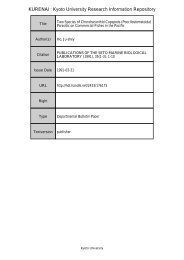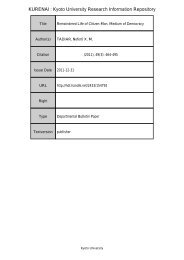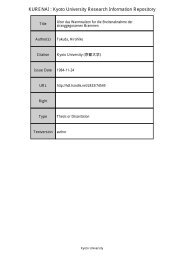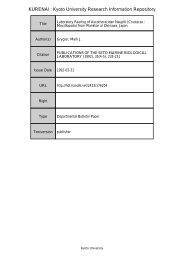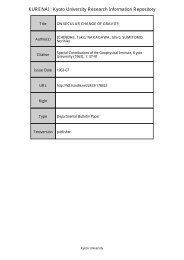THE HISTORICAL CONSCIOUSNESS OF GEORG LUKACS
THE HISTORICAL CONSCIOUSNESS OF GEORG LUKACS
THE HISTORICAL CONSCIOUSNESS OF GEORG LUKACS
You also want an ePaper? Increase the reach of your titles
YUMPU automatically turns print PDFs into web optimized ePapers that Google loves.
2 T. HIRAI<br />
at Budapest University he studied at Berlin University and then at Heidelberg,<br />
_ that the background of his thought was formed by his friendly association with<br />
Simmel, Rickert and Max Weber, and that such a bourgeois academic baptism<br />
had characterized his own interpretation of Marxism 1). Moreover, he has been<br />
criticized as "Western European" by a number of literary men who are supporters<br />
of the socialist realism of the Soviet Union and Eastern Europe, because he devoted<br />
himself to and admired classical German literature, such as the works of Goethe,<br />
and the Enlightenment represented by Lessing. Particularly because of his<br />
participation in Hungarian Revolution, by joining Nagy, his academic influence<br />
has been shut out from East Germany, and it is further reported that his political<br />
position has been in danger'). The fact that the twelve volumes of The Collected<br />
Works of Lukacs, including his masterpiece "Characteristics of Aesthetics" written<br />
in his lates years, have recently been published by Lufterhand in West Germany<br />
is an eloquent illustration of his position in Eastern Europe.<br />
Politics frequently revolts cruelly against thinkers. The thinker Lukacs took<br />
part in two dramatic revolutions, conspicuous in 20th century world history, -<br />
the "Hungarian Revolution" in 1919 and the "Hungarian Rising" in 1956, and<br />
had to experience their frustration at the risk of his own life. After the collapse of<br />
the Hungarian Revolution in 1919 he fled to Vienna for the time being and took<br />
refuge in Moscow during the period of Fascism. After the Hungarian Rising<br />
took place in 1956, he was forced to live in temporary exile in Bulgaria. Although<br />
he had to spend most of his active days in that way, he always kept his eyes on<br />
Eastern Europe, particularly Hungary'). He has never taken refuge in Western<br />
Europe before and it is not likely that he will ever intend to go there in the future,<br />
however coldly and adversely the wind may blow to him in Eastern Europe at<br />
present. The reason is because Lukacs' mother country is Hungary in the sense of<br />
socialism, being different from a similar Hungarian thinker, Mannheim, who took<br />
1) Lukacs' career is given in "Mein Weg zu Marx, 1933 (Autobiography of my Thought) contri~<br />
buted to Georg Lukacs", Zum siebzigsten Geburtstag, Berlin, Aufbau-Verlag, 1955. Also see Morris<br />
Watnick, Relativism and Class Consciousness: Georg Lukacs, in Revisionism, Essqy on the Risto".v<br />
of Marxist Ideas, edited by Leopold Labedz, London, 1962. See also Hiroshi Mizuta, "Georg<br />
Lukacs", Asahi Journal, Vol. 6, No.7, 1964, which gives a brief outline of Lukacs' thought and<br />
various problems involved.<br />
2) Hiroshi Mizuta, The Country of Fog: The Country of Sun, p. 110. The evaluation of Lukacs in<br />
East European countries appears to vary to a great extent, depending on the political situation<br />
in each country. In East Germany the severest vigilance is given to Lukac.s owing to the Hungarian<br />
Rising and Harich Problem. If this is interpreted in reverse, it means that the greatest<br />
influence of Lukacs has been in East Germany and that his mother country is Germany. In<br />
Czechoslovakia a thaw seems to have set in towards Lukacs, but in Hungary no political<br />
intervention has been officially allowed, being looked upon with cold eyes.<br />
3) It is necessary to make these points more specific. Although he participated directly in political<br />
affairs in his native country, all his scientific works have been written in Germany. It<br />
should not be too hastily concluded that it was because Hungarian academic circles were too<br />
narrow-minded to accept Lukacs' ideas. Ibid., pp. 110-11.






